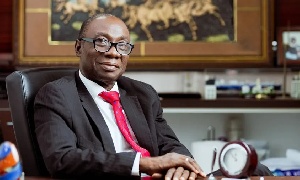- Home - News
- Elections 2024
- News Archive
- Crime & Punishment
- Politics
- Regional
- Editorial
- Health
- Ghanaians Abroad
- Tabloid
- Africa
- Religion
- Photo Archives
- Press Release
General News of Wednesday, 4 June 2025
Source: www.ghanawebbers.com
GH¢1 fuel levy necessary to address legacy energy debt and under-recovery – Dr Kwabena Donkor
Former Minister for Energy, Dr. Kwabena Donkor, supports the new GH¢1 fuel levy. He believes it is essential to address Ghana’s growing energy debt and under-recovery issues.
On JoyNews’ AM Show on June 4, Dr. Donkor discussed two main challenges. The country has significant debts to Independent Power Producers (IPPs). It also struggles to recover the full costs of power generation and distribution.
He stated, “We have a legacy debt of GH¢3.1 billion.” He added that the levy will help with both under-recovery and reducing this debt.
Dr. Donkor urged Ghanaians to be realistic about the levy’s impact. “We can debate its implementation and timing,” he said. However, he warned that it is simplistic to think one cedi will eliminate the debt in two years.
He described under-recovery as a ticking time bomb for the sector's finances. “We are not tackling this major issue,” he noted. Under-recovering costs leads to accumulating more debt.
Dr. Donkor emphasized the importance of consistent payments for energy projects. He explained that project financing typically involves 30% equity and 70% loans. IPPs need these payments to service their loans effectively.
While endorsing the levy, he called for better cost control in the power sector. “The government must work hard to reduce costs,” he insisted. Efficiency improvements are also necessary while addressing legacy debts.
He criticized past management of energy sector levies by former Finance Minister Ken Ofori-Atta. “Ofori-Atta collateralized ESLA inflows but mismanaged funds,” he said, noting some money was used for other government expenses instead of servicing debts.
Dr. Donkor stressed that efficiency improvements are crucial for recovering costs in any business model. Accumulating future debts occurs when costs are consistently under-recovered.
He suggested reviewing petroleum pricing structures to ease consumer burdens. This includes examining the Unified Petroleum Price Margin (UPPM) and related components.
“I support the GH¢1 levy, but we need savings too,” he stated clearly. He believes UPPM should decrease since transportation costs heavily rely on fuel prices.
With recent drops in fuel prices, transport organizations have reduced fares by 15%. Therefore, UPPM should also reflect these changes accordingly.
Dr. Donkor questioned whether current administrative margins remain relevant amid falling inflation and fuel prices. “Should we maintain those levels?” he asked rhetorically.
Even if cost savings are found, parliamentary approval is still needed by law. “Savings could offset the GH¢1 increase,” he explained, but emphasized that Parliament must approve any changes proposed by the Finance Ministry.
His comments provide a balanced view on this controversial levy while highlighting financial sustainability and accountability in Ghana’s energy sector.











